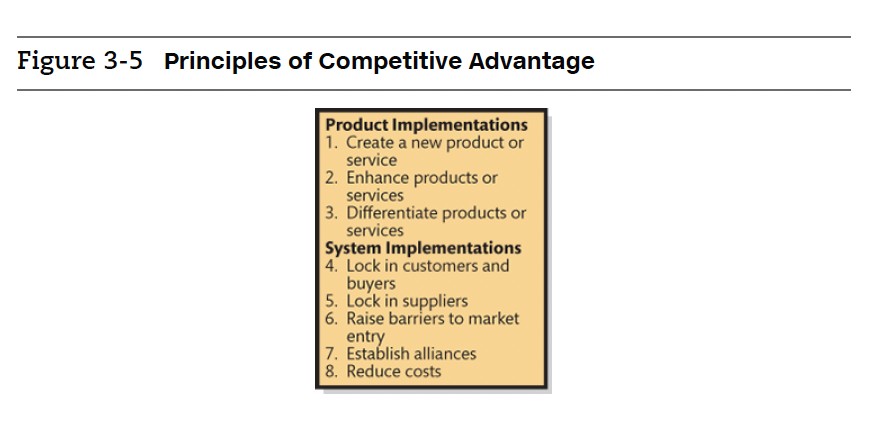Question
So What? Your Personal Competitive Advantage Consider the following possibility: After working hard to earn your degree in business, you graduate, only to discover that
So What? Your Personal Competitive
Advantage
Consider the following possibility: After working hard to earn your degree in business, you graduate, only to discover that you cannot find a job in your area of study. You look for 6 weeks or so, but then you run out of money. In desperation, you take a job waiting tables at a local restaurant. Two years go by, the economy picks up, and the jobs you had been looking for become available. Unfortunately, your degree is now 2 years old; you are competing with students who have just graduated with recent degrees (and fresh knowledge). Two years of waiting tables, good as you are at it, does not appear to be appropriate experience for the job you want. You're stuck in a nightmare that will be hard to get out of?and one that you cannot allow to happen.
Examine Figure 3-5 again, but this time consider those elements of competitive advantage as they apply to you personally. As an employee, the skills and abilities you offer are your personal product. Examine the first three items in the list and ask yourself, "How can I use my time in school?and in this MIS class, in particular?to create new skills, to enhance those I already have, and to differentiate my skills from the competition?" (By the way, you will enter a national/international market. Your competition is not just the students in your class; it is also students in classes in Ohio, California, British Columbia, Singapore, Sydney, and everywhere else they are teaching MIS today.)
Suppose you are interested in a sales job. Perhaps you want to be involved in the pharmaceutical industry. What skills can you learn from your MIS class that will make you more competitive as a future salesperson? Ask yourself, "How does the pharmaceutical industry use MIS to gain competitive advantage?" Use the Internet to find examples of the use of information systems in the pharmaceutical industry. How does Pfizer, for example, use a customer information system to sell to doctors? How can your knowledge of such systems differentiate you from your competition for a job there? How does Pfizer use a knowledge management system? How does the firm keep track of drugs that have an adverse effect on each other?
The fourth and fifth items in Figure 3-5 concern locking in customers, buyers, and suppliers. How can you interpret those elements in terms of your personal competitive advantage? Well, to lock in a relationship, you first need to have one. So do you have an internship? If not, can you get one? And once you have an internship, how can you use your knowledge of MIS to lock in
your job so that you get a job offer? Does the company you are interning for have an information system for managing customers (or any other information system that is important to the company)? If users are happy with the system, what characteristics make it worthwhile? Can you lock in a job by becoming an expert user of this system? Becoming an expert user not only locks you into your job, but it also raises barriers to entry for others who might be competing for the job. Also, can you suggest ways to improve the system, thus using your knowledge of the company and the system to lock in an extension of your job?
Human resources personnel say that networking is one of the most effective ways of finding a job. How can you use this class to establish alliances with other students? Does your class have a website? Is there an email list server for the students in your class? How about a Facebook group? How can you use these to develop job-seeking alliances with other students? Who in your class already has a job or an internship? Can any of those people provide hints or opportunities for finding a job?
Do not restrict your job search to your local area. Are there regions of your country where jobs are more plentiful? How can you find out about student organizations in those regions? Search the Web for MIS classes in other cities, and make contact with students there. Find out what the hot opportunities are in other cities.
Finally, as you study MIS, think about how the knowledge you gain can help you save costs for your employers. Even more, see if you can build a case that an employer would actually save money by hiring you. The line of reasoning might be that because of your knowledge of IS, you will be able to facilitate cost savings that more than compensate for your salary.
In truth, few of the ideas that you generate for a potential employer will be feasible or pragmatically useful. The fact that you are thinking creatively, however, will indicate to a potential employer that you have initiative and are grappling with the problems that real businesses face. As this course progresses, keep thinking about competitive advantage, and strive to understand how the topics you study can help you to accomplish, personally, one or more of the principles in Figure 3-5.

Step by Step Solution
There are 3 Steps involved in it
Step: 1

Get Instant Access to Expert-Tailored Solutions
See step-by-step solutions with expert insights and AI powered tools for academic success
Step: 2

Step: 3

Ace Your Homework with AI
Get the answers you need in no time with our AI-driven, step-by-step assistance
Get Started


